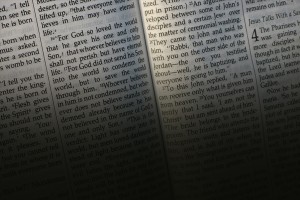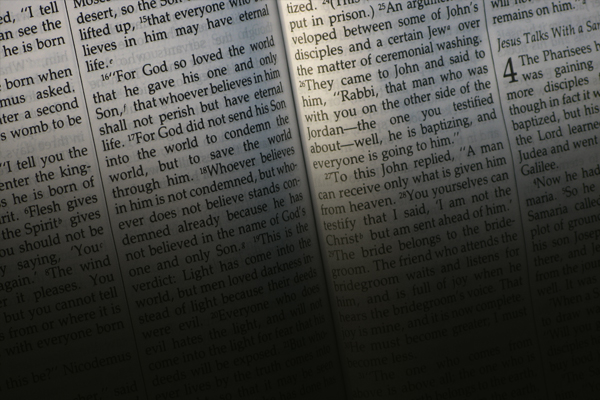
Eyewitness Accounts Vary Based on Their Scope
When I interview an eyewitness, I am very careful to set the parameter for the testimony before I begin. I usually frame the interview by saying something like, “Please tell me everything you saw from the moment the robber came in the bank, to the moment he left.” I make sure to set the constraints the same way for each and every witness. Without these parameters, the resulting testimony would vary wildly from person to person. Some would include details prior to or after the robbery, some would include only the highlights, and some would omit major elements in the event. If I want to be able to compare the testimony of two or three witnesses later, I’m going to have to make sure they begin with the same scope and framework in mind.
The Gospel authors clearly did not testify with the same initial instructions. There was no unifying investigator present to set the framework for their testimony, so their responses vary in the same way they would vary today if the scope of their testimony was not established from the onset. Mark, according to Papias, the 1st Century Bishop of Hierapolis, “became Peter’s interpreter and wrote accurately all that he remembered, not, indeed, in order, of the things said and done by the Lord. For he had not heard the Lord, nor had followed him, but later on, followed Peter, who used to give teaching as necessity demanded but not making, as it were, an arrangement of the Lord’s oracles, so that Mark did nothing wrong in thus writing down single points as he remembered them. For to one thing he gave attention, to leave out nothing of what he had heard and to make no false statements in them.” More concerned about accuracy of individual events than the order in which they occurred, Mark offered details like many of my witnesses who are interviewed without a unified parameter. Mark is simply recording the preaching of Peter, and Peter only referred to portions of Jesus’ life and ministry, making no effort to order them for his listeners.
Eyewitness Accounts Vary Based on Their Perspective and Purpose
In addition, the witnesses I interview often want to highlight a particular element in the crime scene or a particular suspect behavior they think is important. Sometimes their choice of detail is influenced greatly by their own life history. Their values, experiences and personal concerns guide their selection of which details they include, and which they omit. Witnesses also typically try to offer what they think I am looking for as the detective rather than every little thing they actually saw. They are speaking to a specific audience (an investigator), and this has an impact on what they choose to include or omit. When this happens, I have to refocus each witness and ask them to fill in the details they skipped over, including everything they saw, even if they don’t think it’s important to me as a detective. If I don’t encourage eyewitnesses to be more inclusive and specific, they will omit important details.
The Gospel authors were not similarly directed. They had specific audiences in mind and particular perspectives to offer, and none of their testimony was guided by a unifying investigator who could encourage them to fill in the missing details. Luke clearly had a particular reader in mind (Theophilus): “Inasmuch as many have undertaken to compile an account of the things accomplished among us, just as they were handed down to us by those who from the beginning were eyewitnesses and servants of the word, it seemed fitting for me as well, having investigated everything carefully from the beginning, to write it out for you in consecutive order, most excellent Theophilus; so that you may know the exact truth about the things you have been taught (Luke 1)”. Like other witnesses and historians, Luke likely allowed his intended audience to influence his selection of details. His testimony was also most certainly shaped by his own life experience (as an educated man),his own personal history, and his values. Matthew did something similar when he highlighted the details of Jesus’ life most relevant to Matthew’s Jewish audience.
Eyewitness Accounts Vary Based on Their Knowledge of Other Testimony
Sometimes an eyewitness will only provide those details he thinks are missing from the testimony of others. This is most likely to occur if the witness is the last one to be interviewed and he (or she) is already familiar with the testimony of the other witnesses. When I see this happening, I ask this last witness to pretend like he or she is the only witness in my case, “Try to include every detail like I’ve never heard anything about the case. Pretend like I know nothing about the event.” Once the witness has done that, I may go back and re-interview the prior witnesses to see why they didn’t mention the late details offered by the final witness. In the end, my reports related to everyone’s testimony will be as complete as possible, including all the details remembered by each person I interviewed.
The gospel authors were not similarly directed and re-interviewed. John was the last person to provide an account, and he clearly selected those events important to him, given his stated goal: “…many other signs Jesus also performed in the presence of the disciples, which are not written in this book; but these have been written so that you may believe that Jesus is the Christ, the Son of God; and that believing you may have life in His name (John 20)”. John knew what had already been provided by others, and he selected specific events (some which were previously unreported) to make his case. He acknowledged his limited choice of data: “…there are also many other things which Jesus did, which if they were written in detail, I suppose that even the world itself would not contain the books that would be written (John 21)”. John admitted what we already know: witnesses pick and choose from their own observations unless they are specifically directed to do otherwise. Because the gospel authors were not specifically instructed, guided or re-interviewed by a single detective, we simply cannot conclude much from the differences between the accounts. Share on X
Skeptics sometimes infer more from omissions (or inclusions) in the Gospels than what is reasonable, especially given the manner in which the Gospels came to be written. Because the four authors were not specifically instructed, guided or re-interviewed by a single detective, we simply cannot conclude much from the differences between the accounts. We must, instead, do our best to employ the four part template we use to evaluate eyewitness reliability after the fact. This template (as I’ve described it in Cold-Case Christianity), provides us with confidence in the trustworthy nature of the Biblical narratives. That’s why you can trust the Gospel eyewitness accounts, even though some are missing important details.

J. Warner Wallace is a Dateline featured Cold-Case Detective, Senior Fellow at the Colson Center for Christian Worldview, Adj. Professor of Christian Apologetics at Talbot School of Theology, Biola University, author of Cold-Case Christianity, God’s Crime Scene, and Forensic Faith, and creator of the Case Makers Academy for kids.
Subscribe to J. Warner’s Daily Email
J. Warner Wallace is a Dateline featured cold-case homicide detective, popular national speaker and best-selling author. He continues to consult on cold-case investigations while serving as a Senior Fellow at the Colson Center for Christian Worldview. He is also an Adj. Professor of Christian Apologetics at Talbot School of Theology, Biola University, and a faculty member at Summit Ministries. He holds a BA in Design (from CSULB), an MA in Architecture (from UCLA), and an MA in Theological Studies (from Gateway Seminary).

































Pingback: Quora
Pingback: Ten Principles When Considering Alleged Bible Contradictions | A disciple's study
Pingback: Ten Principles When Considering Alleged Bible Contradictions | Apologetics ForumApologetics Forum
Pingback: Ten Principles When Considering Alleged Bible Contradictions
Pingback: Midweek Apologetics Roundup - Stephen J. Bedard